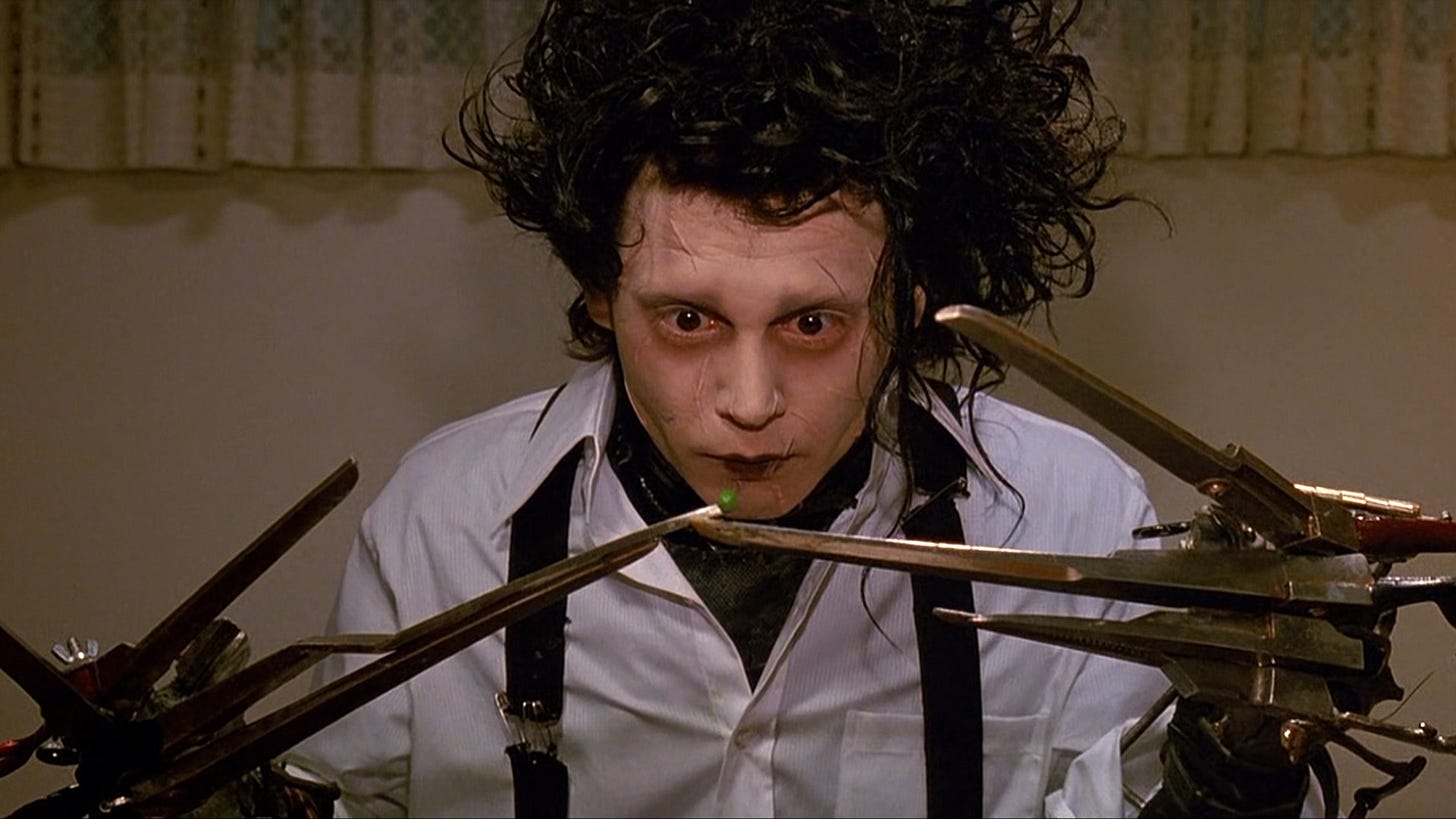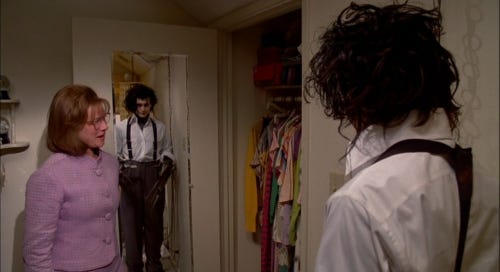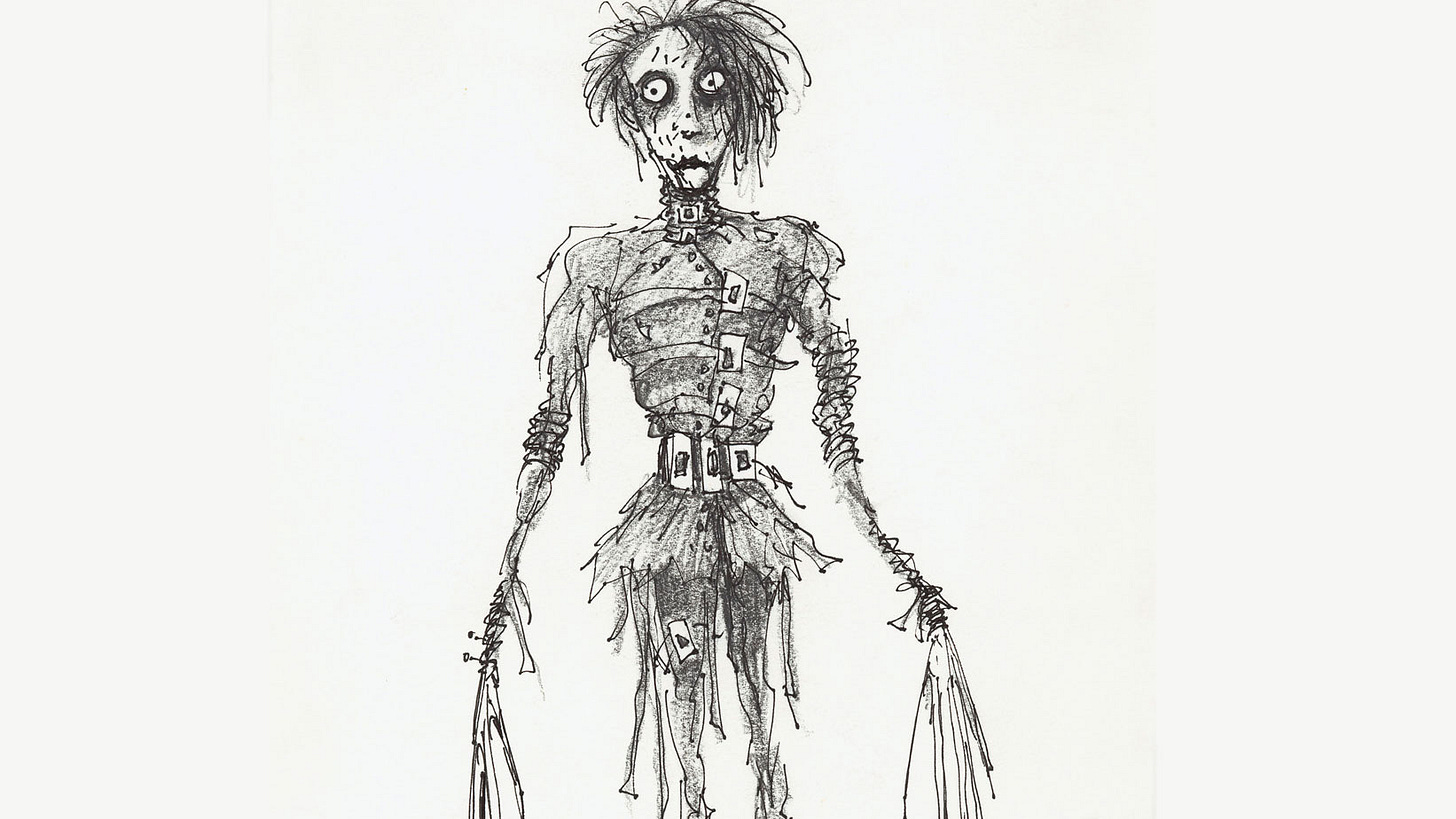edward scissorhands (1990) is a film for the outsiders
'he has been sent first to tempt you. but it's not too late. you must push him from you, expel him! trample down the perversion of nature!'
We have all felt deeply misunderstood at some point in our lives. It is a common, yet haunting, feeling which Tim Burton captures so well in his 1990 film Edward Scissorhands; a fable-like story which details the movement of an artificial man who has scissors for hands (because his creator died before he could be finished) to a modern, conventional suburbia. Whereas Tim Burton has always been the type of director to push the boundary of supposed normality with his stories told, Edward Scissorhands tends to lean more autobiographical, Edward’s story falling similar to the isolation and lack of connection that Burton himself had felt when he was a teenager.
The most important aspect to consider is in no way is Edward presented as a villain throughout this film. His wild appearance is juxtaposed with his soft-spoken words and kind, loyal nature. Seemingly, his lack of physicality because of his hands are the barrier for people perceiving him as he truly is.
When he first arrives into this modern suburbia, he is immediately a curiosity for this tight-knit group of female neighbours. All the houses are the pinnacle of sameness. Painted bright, garish, rainbow colours and their costumes (designed by Colleen Atwood) follow the same pattern, each woman sticking to their own shade. The colours connote intrusion, matching the women’s behaviour, and as they discover his talents for hairdressing, making animals out of bushes and dog grooming, they begin to fetishise his differences and take advantage of his kindness. One of the most obvious examples is when he goes to Joyce’s salon, she attempts to sexually assault him, and when Edward somehow gets her off him, she manipulates his extension of kindness and tells the neighbourhood he tried to sexually assault her instead.
Even being taken in by a modern family has it’s initial limitations for Edward. Avon lady Peg Boggs finds him alone and parentless in his gothic, dilapidated mansion which overlooks the uniform suburbia that she operates in. She extends him a helping hand and invites him into a world he is familiar with but not had in a long time; family.
Whilst Peg and love interest Kim can look past his lack of mobility, his awkwardness and the glorification of his talent, the same can’t be said about his other family members. Peg’s young son Kevin immediately looks for the value in him by asking to take Edward into school for show and tell, which of course Edward agrees to, and Kevin’s father Bill doesn’t even try to understand him. To them, he will always be weird, and will never attempt to refute that.
Something I found particularly interesting was how Caroline Thompson, the screenwriter of a few Burton films, and Burton himself described the casting experience for Edward; ‘When we were looking to cast that part, I was looking for somebody who got the idea, that sadness, of being mis-perceived’. From Jim Carey, Michael Jackson, Tom Hanks and even Robert Downey Jr, final casting was up in the air for a while until they finally landed on Johnny Depp. Gary Oldman was even sent the script and branded it ‘ridiculous’, saying he did not understand it.
Caroline Thompson also recounted the experience of Edward option Tom Cruise when he sat down with Tim Burton, asking how Edward ‘went to the bathroom’.
‘If you start asking those questions, the whole thing falls apart. You can’t ask questions like that. If you ask questions like that, you’re fucked. You’ve missed the metaphor. You’ve missed the point.’
Upon release, this film was very misunderstood in itself, just like Tom Cruise’s approach to the role. This is a perfect example of the ever-changing way media can interpreted over time, as Edward Scissorhands resonates with it’s audience, especially young people, in an entirely more thoughtful manner.
What was once curiosity about Edward, then eventually turns to deeming him a threat. His alienation is taken to an even further length, as his innocence is abused by Jim who manipulates Edward into breaking into his parents house, knowing the power they have to ruin reputations.
Although this is a more obvious example of this descent into Edward’s supposed villainy, what I found more profound was how Burton presented the hypocrisy and double standards the community placed on Edward when it came to basic human emotion. Anger is very present throughout this film. Jim has increasing anger whenever Edward and Kim seem too close, and the neighbours get particularly angry with him when Edward starts lashing out physically and cutting things down. Yet, when Edward expresses his anger he is deemed a freak. The neighbours can be uncomfortable being seen with him after he gets arrested but Edward can’t be uncomfortable with Joyce’s unwanted sexual advances. Kim loving Jim is perfectly normal, but her showing interest in Edward is strange and uncanny. It is heartbreaking and completely frustrating to watch.
As I mentioned, Edward Scissorhands tends to lean more autobiographical than some of his other work due the story behind the creation of this character. As a teenager, Burton created an image (above) of a boy with scissors for hands to encapsulate this feeling of being unable to reach out and connect with others.
Kim: Hold me.
Edward: I can’t.
Overall, I really, really love this film. Edward is a character which sees me, and so many others, in ways that can’t be seen in other characters. It has withheld the test of time with it’s relatability, and is a must watch for anyone.
Letterboxd Rating: ★★★★★






